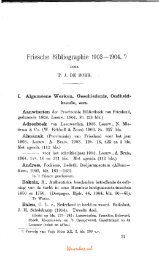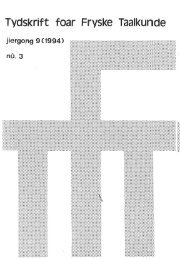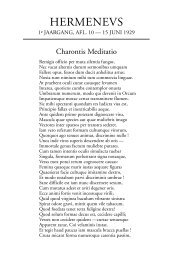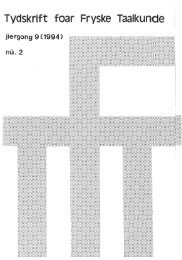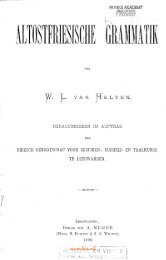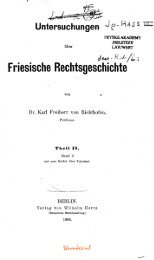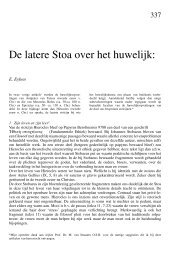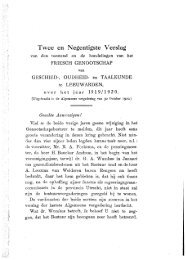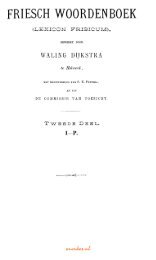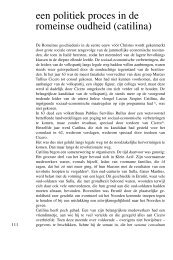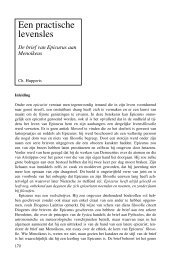It wurk fan Gysbert Japix n-2 - Tresoar
It wurk fan Gysbert Japix n-2 - Tresoar
It wurk fan Gysbert Japix n-2 - Tresoar
Create successful ePaper yourself
Turn your PDF publications into a flip-book with our unique Google optimized e-Paper software.
seeks to retrieve a person's opinions on political, religious and cultural matters<br />
through his personal relations (here applied out of necessity) is that it offers many<br />
possibilities of checking interpretations by drawing more people into the investigation.<br />
Moreover, the outcome relates more immediately to the person in concern than<br />
the result of a general investigation into prevailing opinions in the seventeenth Century<br />
without differentiation would do. Since the inventories of their bookcollections<br />
are the most important sources for the information on the intellectual interest and<br />
erudition of both the poet and his father, as many library inventories as possible of<br />
inhabitants of Friesland from 1600 to 1680 have been collected and compared.<br />
Nothing is known about GJ's youth, apart from what can be deduced from his origins.<br />
His father Jacob <strong>Gysbert</strong>s (henceforth JG) was as important a man as he was<br />
controversial in Bolsward, the town in which or near to which also his son lived for<br />
his entire life, with the exception of perhaps less than a year. JG was a joiner and a<br />
tax collector. He may have designed the handsome town hall of Bolsward (1614). His<br />
library inventory from 1644, when compared to the inventories of others, shows a<br />
rather broad interest in politics and an exceptionally great interest in religious<br />
issues. He was a pronouncedly orthodox Calvinist.<br />
His voting for new provincial taxes in 1634 eamed JG the hatred of at least part of<br />
the Bolsward citizenry. The general wave of Opposition against these taxes throughout<br />
the province caused much political upheaval, which in 1635 lead to the dismission<br />
of the municipality in Bolsward, as it did in other Frisian towns. Only through<br />
Intervention from The Hague by the Council of State in 1637 could the authority of<br />
the Frisian stadtholder - to whom belonged the privilege of appointing officials - be<br />
restored. The Opposition was organized by prominent families from the nobility,<br />
who mainly lived in the country side. Both sides had support in the towns. Until the<br />
end of 1646 the local faction of Van Velsen, to which JG belonged, was the strengest,<br />
after which year the other side gained the upper hand. In the early 1650s relations improved.<br />
By the end of 1640 JG was appointed burgomaster for the period of two years<br />
in lieu of a deceased memberof the magistrate. His appointment aroused much resistance,<br />
but as presiding burgomaster he took control of the Council of burgomasters<br />
and ruled with a firm hand. In 1644-1645 his faction fought out with the Presbitery<br />
the question of the right of appointing new ministers. <strong>It</strong> caused a great deal of<br />
commotion throughout Friesland, and the issue drew a lot of national attention, too.<br />
Even Voetius, who sided with the Presbitery, made statements on the issue.<br />
<strong>It</strong> was in this town, disrupted by disputes, that GJ was appointed municipal<br />
schoolmaster in 1637, after having worked for some time as a schoolmaster in the<br />
countryside. The appointment was made by the new magistrate of which his father, it<br />
is true, formed no part, as he was a sworn member of the municipality, but in which<br />
his faction had nonetheless a majority. This may have made the appointment a<br />
friendly turn. What seems to be certain is that GJ agreed with his father in political<br />
matters, for he himself was a friend of Van Velsen's, too.<br />
For the rest, GJ was not involved in politics, something which he was not allowed<br />
to, anyway, as a municipal official. His interest in politics does not seem to have been<br />
great, witness the inventory of his library at the time of his death. What his book collection<br />
does show, however, also when compared to other ones, is an exceptionally<br />
great interest in literature, an interest which seems to be descernable from as early as<br />
wumkes.nl<br />
513



